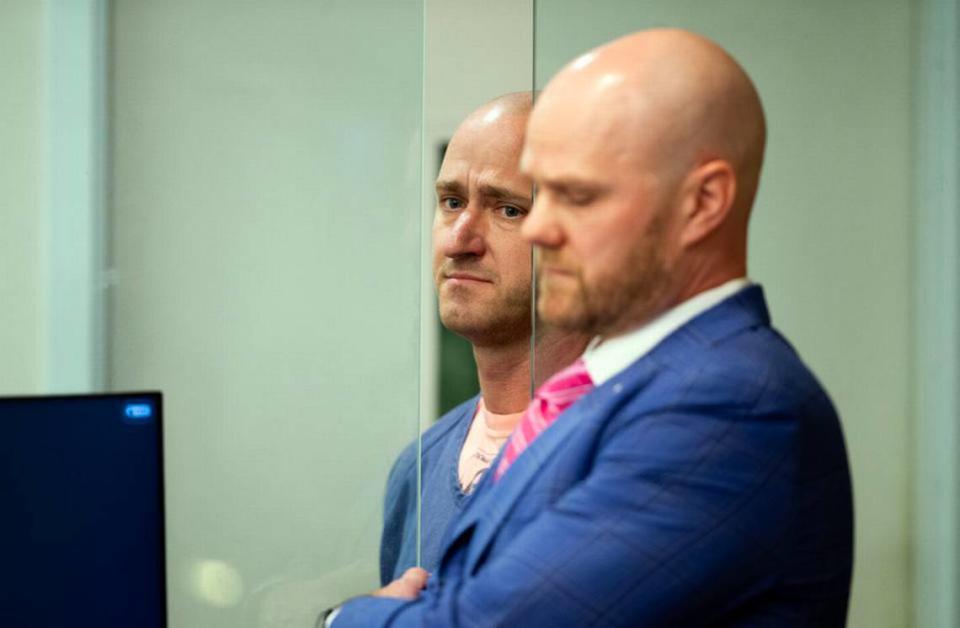Pilot who tried to crash flight just set back all public goodwill for psychotropics | Opinion
An off-duty Alaska Airlines pilot who suffered a mental breakdown mid-flight and tried to shut off the engine, endangering more than 80 lives, is partially basing his defense on the fact that he ingested “magic mushrooms” 48 hours before the flight.
Joseph Emerson, 44, was riding as passenger in the cockpit’s jump seat on Alaskan Airlines flight 2059 from Washington state to San Francisco when he tried to disable the engines somewhere over Oregon. He was restrained by the flight crew and the plane made an emergency landing in Portland.
Emerson appeared in a state court there on Tuesday afternoon, where he pleaded not guilty to 83 charges of attempted murder and one count of endangering an aircraft.
Opinion
According to court documents, Emerson told authorities he was having a mental crisis and had been depressed for the past six months. He also told police that he had taken “magic mushrooms” for the first time about 48 hours before boarding.
But psilocybin and psilocin — the “magic” in those ‘shrooms — simply aren’t the boogeymen they’re often made out to be, and anyone who says differently is likely unaware of the depth of research that’s been done in recent years.
The naturally occurring hallucinogens found in certain mushroom varieties don’t last 48 hours, nor do they typically induce homicidal actions, like trying to kill a plane full of people. Peak effects occur about two to three hours after ingestion.
In fact it’s much more likely that Emerson’s lack of sleep contributed more to his breakdown than the psychedelics that he ate more than two days before. Emerson reportedly told authorities that he hadn’t slept in more than 40 hours, and researchers at Columbia University’s Department of Psychiatry have said that sleep deprivation studies show even otherwise healthy people have experienced increased anxiety and distress following periods of poor sleep.

“Sleep problems can also contribute to the onset and worsening of different mental health problems, including depression, anxiety, and even suicidal ideation,” states the department on its website.
According to scientists at the UC Berkeley Center for the Science of Psychedelics, psilocybin — in combination with therapy — can alleviate depression and anxiety in cancer patients and provide relief from substance abuse disorders and post-traumatic stress disorder. Some research has shown it may also help treat the eating disorder anorexia and the psychological distress that can accompany neurodegenerative diseases, like dementia.
Ironically, Oregon, where Flight 2059 was diverted for its emergency landing, is the first U.S. state to have decriminalized psychedelic medicine. Colorado was the second, and California was very nearly the third — until Gov. Gavin Newsom vetoed the Senate Bill 38 earlier this month.
Sen. Scott Wiener, who introduced the legislation, told the Los Angeles Times that the state’s current laws and tracking methods “unfairly lumps psychedelics in with other controlled substances like meth and heroin, despite the fact that psychedelics are not addictive.”
The legislation would have decriminalized adults possessing and using psychedelic mushrooms and DMT, also known as dimethyltryptamine, the key ingredients in the psychedelic brew known as ayahuasca. SB 58 would have applied to people 21 or older, and did not allow for the transfer or sale of psilocybin, psilocin or DMT.
Newsom said in his veto statement that he declined to approve the legislation in part because it would have decriminalized possession “prior to … guidelines going into place.”
But “around the world, hundreds of new and ongoing research studies and clinical trials are testing how psychedelic substances interact with our bodies and exploring the possible benefits of therapies on physical health,” according to the Berkeley Center for the Science of Psychedelics’ website.
“New studies are also focusing on how psychedelics affect general behavior, mood, cognition and brain function and health, and are using psychedelics as tools to better understand fundamental properties of the mind and brain,” their website states.
Psychotropic therapies have already proven to be beneficial for veterans and people who live with severe depression and anxiety, but the American public — as evidenced by Newsom’s political punt earlier this year and Emerson’s defense logic — still see them as big, bad, scary drugs.
California could have been at the forefront of research into this therapy that stands to help millions recover from serious and debilitating mental illness.
As someone who suffers from severe anxiety and depression myself, the possibility of someday being able to get off selective serotonin reuptake inhibitors (also known as SSRIs) is a breathtakingly hopeful thought. I would try psychotropic therapy in a heartbeat if there was an opportunity to do so. But, for me and for now, those opportunities are extremely limited.
Still, California may have the last word on this yet, as two potential ballot initiatives are circulating that would legalize certain psychedelics — including psilocybin and psilocin — and provide $5 billion in funding for research. The first would create a state agency to regulate psychedelic medicines, while the second would specifically decriminalize “the cultivation, manufacture, processing, distribution, transportation, possession, storage, sale and personal use of psilocybin mushrooms.” Neither initiative has yet to qualify for the ballot, but they may reflect the public’s emerging political interest in challenging a long-held status quo.
But in the meantime, attaching Emerson’s inexplicable actions on this Alaska Airlines flight to his use of psilocybin is a red herring, and stands against all scientific evidence to the contrary. Such a sad anecdote serving as any kind of “evidence” will only serve to stoke the public’s irrational fears around safe drug use.
Don’t blame this incident on magic mushrooms. Blame it on a backward society that sees severe mental health — and the therapies used to treat it — as something shameful.

